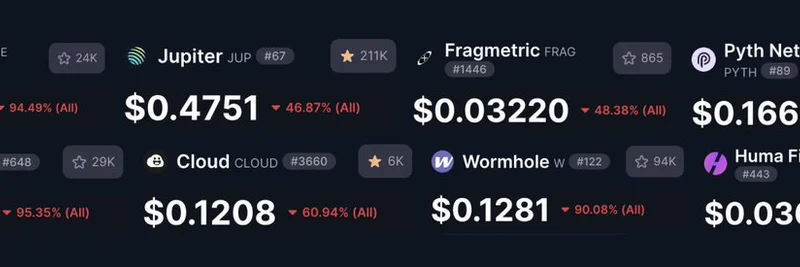In the fast-paced world of Solana's blockchain ecosystem, where the native SOL token has been on a tear, many governance tokens tied to popular projects are telling a different story. A recent thread from Solana researcher @sol_nxxn on X (formerly Twitter) highlights this disconnect, sparking discussions among crypto enthusiasts about airdrops, token utility, and the harsh realities of market performance.
The thread kicks off with a stark visual of several Solana-based tokens in deep red, showing massive all-time declines. For instance, Magic Eden's $ME is down 94.4%, Jupiter's $JUP has plummeted 46.87%, and others like Pyth Network's $PYTH and Tensor's $TNSR are suffering losses exceeding 69% and 95%, respectively. This screenshot paints a picture of widespread pain in the governance token space, even as SOL itself continues to perform strongly.
@Sol_nxxn points out the ongoing debates around these tokens not mirroring SOL's success, including FUD (fear, uncertainty, and doubt) surrounding $JUP and complaints about the upcoming utility for $MET. Governance tokens, for those new to the space, are essentially digital assets that give holders voting rights or other privileges in decentralized projects, often distributed via airdrops to reward early users, farmers (those who provide liquidity or participate in protocols to earn rewards), investors, and team members.
The core challenge, as outlined in the thread, is balancing generous airdrops with maintaining long-term token value. Projects aim to distribute tokens widely to bootstrap communities, but this can lead to oversupply and selling pressure. "There's no 100% clear concept on how to do big airdrops... and at the same time make people want to buy it and keep the price strong for longer term," @sol_nxxn notes. Some teams experiment with buybacks—using project revenues to repurchase and burn tokens—or revenue-sharing models, but results have been mixed.
Looking ahead, the post suggests potential innovations like vested airdrops (where tokens unlock gradually over time to reduce immediate selling) or more aggressive buyback strategies. These could help stabilize prices, but for now, the advice is pragmatic: "I'd honestly suggest selling majority of airdrops in first weeks/months if you want to secure your piece and don't want to play the risky game and gamble."
Replies to the thread echo this sentiment and add layers to the conversation. One user, @DRanger, praises @sol_nxxn's profit-taking skills, emphasizing how tough it is to sell at the right time in any investment. @CryptoParsel expresses shock at tokens like Tensor and Magic Eden underperforming even Wormhole, highlighting the severity of the dumps. Others, like @M Ali, critique uneven airdrop distributions where a few whales get massive allocations while most receive crumbs, exacerbating sell-offs.
@Ticketguy suggests that many of these tokens were primarily created to reward communities without deep integration into the products themselves, making sustained pumps unlikely unless utility is enhanced. And @GaudD_ shares a personal plan to unstake and sell their $JUP, predicting continued bleeding unless the team intervenes—something they doubt will happen.
This discussion is particularly relevant for meme token enthusiasts on Solana, as the ecosystem's volatility often mirrors these patterns. Meme tokens, driven by hype and community rather than traditional utility, face similar airdrop dilemmas. Projects like those on Jupiter or Magic Eden frequently intersect with memes, where quick flips can turn into long-term holds gone wrong.
For blockchain practitioners, the takeaway is clear: While airdrops offer exciting opportunities, treating them as windfalls rather than long-term bets can protect your portfolio. Always research tokenomics—the economic model behind a token, including supply, distribution, and incentives—before holding. In a market where SOL shines but its satellites dim, smart selling might just be the key to navigating the chaos.
If you're diving into Solana memes or governance plays, keep an eye on evolving models like vested distributions. They could reshape how projects reward users without tanking prices. Stay informed, sell wisely, and remember: In crypto, securing profits is an art form.



